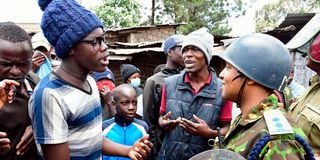Premium
Locating the soul of our nation

Mathare residents confront anti-riot police officers on March 30, 2023, while pleading for peace and an end to the battles with area residents during the Azimio anti-government protests.
I have been watching with dismay the opposition-led protests over the cost of living, among a raft of other demands.
While I defend the right of the antagonists to express themselves, I strongly feel that this is being undertaken outside the confines of what is legal and moral.
The razing of places of worship in Kibra is a stark reminder of our dark past, whose underlying causes we are yet to address. The attack on the Kenyatta family’s Northlands property shows a vengeful government. This has worsened the situation.
When faced with an existential crisis of such magnitude, leadership must arise. Thus, the window for talks by President William Ruto is most welcome. I also commend former Prime Minister Raila Odinga for accepting to engage in a bipartisan dialogue to untangle Kenya from the crisis.
As the two sit down to deliberate, they should know that the problems go beyond Kenya and extend to the continent. We are part of a scheme crafted by our colonisers and global economic systems. Sadly, our political leaders are blinded and are not courageous enough to liberate the people.
God did not intend to place people with money, property and capital on one side and those with nothing but their capacity to labour on the other.
Nor did He ordain that there be a rich, powerful and privileged North and a poor, disadvantaged and servile Souths. The propertied and the propertyless, capitalists and working class, the rich and the poor, the landlord and the landless, and the powerful and the powerless were created through human agency.
Religion and law are tools that can liberate. Conversely, they have historically been used to oppress and tame the masses. Prof Issa Shivji, the storyteller from the University of Dar es Salaam, introduces us to the popular story of Robinson Crusoe.
Crusoe had a servant, Friday To rehabilitate the “savage cannibal” into a disciplined and obedient servant, he used a gun and a Bible. Friday stood in awe, astonishment and bewilderment at the gun. He did not touch it for several days but would speak to it and talk to it as if it had answered him when he was by himself.
He desired that it not kill him. Eventually, Crusoe taught Friday how to handle the gun and even gave him one, but only after he had taught him the Bible rules not to kill and to be obedient and loyal to the master.
Prof Shivji wrote about the role of lawyers in neoliberalism, the political philosophy advanced by former British Premier Margaret Thatcher and former American President Ronald Reagan.
In this treatise, the good professor questioned whether lawyers should act as professional supplicants to those in power or simply be an amateur conscience for society.
Globalisation
This thinking naturally gravitated me towards the works of Prof Yash Tandon, who argues in Trade is War that globalisation has reduced many aspects of modern life to little more than commodities controlled by multinationals.
Drawing on decades of on-the-ground experience as a high-level negotiator in bodies such as the World Trade Organization, he insists that, for most people, especially in the poorer regions, free trade not only hinders development, it visits relentless waves of violence and impoverishment in their lives.
I strongly feel the Kenyan crisis mirrors this argument: A clash between unbridled capitalism and the need to provide public goods such as water, health and education.
Kenya is a colonial state, and it is time we defined statehood differently. In politics, there is the concept of statecraft, the skillful management of state affairs.
In a colonial state, self-preservation is the most important goal. Security is the most important goal. Everything else, including proper management of the economy, is secondary.
Our political systems, including institutions, rules and norms, were imported from Britain and are no longer fit for purpose. They were meant to facilitate the post-colonial transition, sustain the trend of extracting resources to the West and undermine the “natives”. A special class of elites were trained, mentored and skilled to operate the system and benefit from it.
Despite the 2010 Constitution, we have not made progress in uniting or developing the country—unless within the framework of a colonial state. To deviate from this Western-centric political system requires adventurism and the attendant risk to do so.
Traditional models cannot also work with the new reality. I propose the philosophy of African socialism as a beginning to rediscover the soul of this nation, sharing of resources in a traditional way.
We could begin by re-examining the philosophies of former Presidents Mwalimu Julius Nyerere of Tanzania, Kwame Nkrumah of Ghana and Modibo Keita of Mali.
But we must redefine the role of the state as a developmental one and put it in charge of controlling the economic space to ensure all benefit. Let us look at Rwanda and Dubai as examples which we can build upon while addressing some of the shortfalls in the stated examples.
The colonial enterprise spreads to our neighbours. We could form a common charter and become a federation of decolonised states with a common philosophy—Ubuntu or Utu—bound by a common language, Kiswahili, and including all of East Africa.
The extractive colonial state will still seek to undermine our unity. We must be prepared to fight for our beliefs and protect them from external interests.
Canon Rev Dr Wainaina is the provost of All Saints Cathedral, Nairobi.



